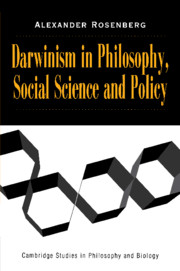Book contents
- Frontmatter
- Contents
- Introduction
- 1 A Field Guide to Recent Species of Naturalism
- 2 Naturalistic Epistemology for Eliminative Materialists
- 3 Limits to Biological Knowledge
- 4 Reductionism Redux: Computing the Embryo
- 5 What Happens to Genetics When Holism Runs Amok?
- 6 The Biological Justification of Ethics: A Best-Case Scenario
- 7 Moral Realism and Social Science
- 8 Contractarianism and the “Trolley” Problem
- 9 Does Evolutionary Theory Give Comfort or Inspiration to Economics?
- 10 The Political Philosophy of Biological Endowments: Some Considerations
- 11 Research Tactics and Economic Strategies: The Case of the Human Genome Project
- Bibliography
- Index
1 - A Field Guide to Recent Species of Naturalism
Published online by Cambridge University Press: 06 July 2010
- Frontmatter
- Contents
- Introduction
- 1 A Field Guide to Recent Species of Naturalism
- 2 Naturalistic Epistemology for Eliminative Materialists
- 3 Limits to Biological Knowledge
- 4 Reductionism Redux: Computing the Embryo
- 5 What Happens to Genetics When Holism Runs Amok?
- 6 The Biological Justification of Ethics: A Best-Case Scenario
- 7 Moral Realism and Social Science
- 8 Contractarianism and the “Trolley” Problem
- 9 Does Evolutionary Theory Give Comfort or Inspiration to Economics?
- 10 The Political Philosophy of Biological Endowments: Some Considerations
- 11 Research Tactics and Economic Strategies: The Case of the Human Genome Project
- Bibliography
- Index
Summary
In his presidential address to the American Philosophical Association in 1955 Ernest Nagel expounded and defended a philosophy he called naturalism, despite the fact that “the number of distinguishable doctrines for which the word ‘naturalism’ has been a counter in the history of thought is notorious … ” [Nagel, 1956, p. 3]. In retrospect what was distinctive about Nagel's naturalism was its radical departure from the modern western tradition in epistemology. Nagel rejected as an objection to naturalism the charge that it does not secure independently any warrant for the epistemic role it accords the methods of science. According to this objection, in committing itself to the logic of scientific proof without further foundations, naturalism is quite analogous to religious belief in resting on unsupported and indemonstrable faith. Such an argument, Nagel wrote,
has force only for those whose ideas of reason is demonstration and therefore refuse to dignify anything as genuine knowledge unless it is demonstrated from self luminous and self evident premises. But if, as I also think, that ideal is not universally appropriate, and if furthermore, a wholesale justification for knowledge and its method is an unreasonable demand and a misplaced effort, the objection appears quite pointless.
The warrant for a proposition does not derive from a faith in the uniformity of nature, or any other principle with cosmic scope. The warrant derives exclusively from the specific evidence available, and from the contingent historical fact that the special ways employed in obtaining and appraising the evidence have generally been effective in yielding reliable knowledge, [p. 15]
- Type
- Chapter
- Information
- Darwinism in Philosophy, Social Science and Policy , pp. 6 - 33Publisher: Cambridge University PressPrint publication year: 2000

